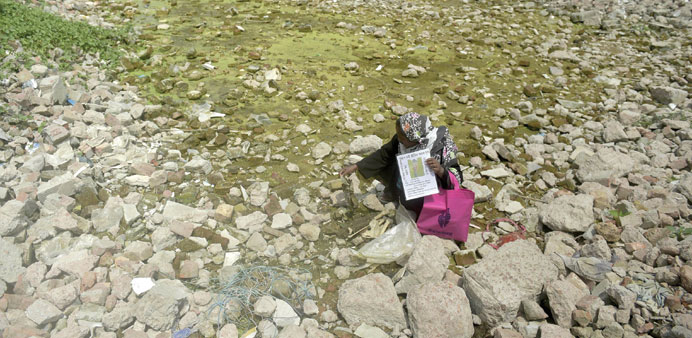A Bangladeshi woman holds a laminated picture of a missing relative and a bone fragment on the site of the former Rana Plaza garment complex in Savar.
Agencies/Dhaka
Two years after the deadly collapse of the Rana Plaza complex, employees in Bangladesh’s garment sector still face exploitative and dangerous working conditions despite government labour reforms, Human Rights Watch (HRW) has said.
While the government and global brands have made progress in improving safety conditions for Bangladesh’s millions of garment workers, many still contend with abuse at work, delayed wages, and threats when they try to form a union, an HRW report said.
“Clearly, it is not enough to focus on safety alone,” Phil Robertson, the rights group’s Asia deputy director, said in a statement.
“Recent tragedies at Bangladeshi factories demonstrate that dangerous working conditions are linked to the failure to respect workers’ rights, including their right to form unions which can help them to collectively bargain for improved safety.”
The Bangladeshi government denies that factory workers are facing difficulties in trying to unionise.
“If we receive any complaints from the trade union leaders that they are facing harassment or obstruction for forming trade unions, we immediately take stern action,” labour and employment ministry secretary Mikail Shipar, told Reuters.
The government has filed more than 100 cases against factory owners or managers since the law was amended, he said.
The collapse of Rana Plaza on April 24, 2013, which killed more than 1,100 garment workers, shone an unprecedented light on unsafe working conditions in Bangladesh’s thousands of garment factories and created urgent demands for global retailers to do more to ensure their workers’ safety.
The $24bn industry is now in the throes of a massive safety overhaul, and more than 2,000 of the country’s 3,500 exporting garment factories have been inspected by the government or as a result of retailer-led initiatives.
But gains for workers’ rights in those factories have been slower to materialise.
On the morning that Rana Plaza collapsed, surviving workers reported that managers had ignored their concerns that the building was not safe - a scenario that observers said could have been avoided if workers had better union representation.
Since then, the labour law has been amended to make it easier to form unions, among other measures, and more than 300 new labour unions have been registered, the government says.
However, workers interviewed by HRW said they were still being beaten and threatened at their factories for trying to organise, or stand up for co-workers’ rights.
A multi-donor fund set up to compensate workers injured in the Rana Plaza collapse and victims’ relatives is still short by about $6mn, the International Labour Organization says.
Rights groups say that shows the enduring lack of commitment by retailers to those who make their clothes.
“Instead of putting the slightest fraction of their profits towards the very people that suffered the most making their clothes, these brands choose to make ever more flimsy excuses,” Ineke Zeldenrust, international co-ordinator of the Clean Clothes Campaign, said in a statement.
Safety overhauls of Bangladesh’s garment factories were running behind schedule and none were considered totally safe two years after the Rana Plaza disaster, a global labour group said yesterday.
IndustriALL said thousands of factories were found to have some structural flaws following inspections carried out in the wake of the tragedy that killed more than 1,100 people.
The Swiss-based group said efforts to upgrade the factories were lagging despite some 200 mostly European retailers signing an agreement to improve them.
“Important progress has been made, but the fact that all remediation is currently behind schedule, some over six months behind, is a serious problem,” IndustriALL said in a statement on the eve of Friday’s anniversary of the disaster.
“It is an unacceptable reality that not a single factory can yet be called 100% safe,” the group, which played a key role in sealing the agreement, said.
The nine-storey Rana Plaza factory complex imploded on April 24, 2013 in one of the world’s worst industrial disasters.
The collapse triggered international outrage and put pressure on European and US brands who had placed orders to improve the woeful pay and conditions at Bangladesh’s 4,500 garment factories.
Two years on, nearly $25mn in compensation has been paid out to survivors and relatives of the dead.
More than 2,500 garment factories have been inspected for structural, fire and electrical safety since the disaster, the ILO said in a statement yesterday.
Despite IndustriALL’s statement, Bangladesh junior labour minister Mujibul Haque hailed progress made so far in improving the safety of Bangladesh’s $25bn garment industry.
“Almost three quarters of garment factories have now been assessed for structural and fire safety with only a very small number being deemed too unsafe to operate,” he said at an event to mark the disaster. The Bangladesh Garments Manufacturers and Exporters Association also said yesterday that major improvements had been made to factories, with only around one percent deemed too unsafe to repair and forced to shut down.

